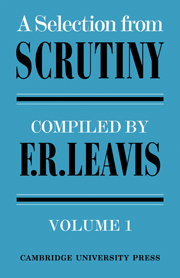6 - THE LITERARY WORLD
Published online by Cambridge University Press: 08 January 2010
Summary
things rank and gross in nature
Possess it merely. That it should come to this!
In discussing the state of reviewing with people of experience—reviewers, editors, publishers and authors—we were commonly, when illustrative anecdote had begun to accumulate into monotony, presented with the conclusion:‘But everybody knows all about it. And anyway, there's nothing you can do.’ In a sense everybody does know. Yet if we could print (as for sufficiently obvious reasons we cannot) some of the choicer of the instances we collected, most of the readers of Scrutiny would have a shock. For the fact is that the cultivated in general do not realize how completely reviewing has ceased to have anything to do with criticism: honest and intelligent reviews still occur, but the function of reviewing (the legitimate function) has lapsed.
Even observing the discretion necessary to escape legal revenge (the law of libel is not as an outraged sense of decency would have it) we might yet surprise the reader with histories and other data illustrating the value of advertising, the reach and thoroughness of the Literary Racket, and the power and vindictiveness of the gangs. But it would still be felt that, while all this was no doubt representative of the classy Sunday papers, the dailies and the more hearty weeklies, yet it had little bearing on—well, on the only weekly (whichever it is one may have chosen) that an intelligent person can read. And to bring the bearing home would require a particularity that is obviously precluded.
- Type
- Chapter
- Information
- A Selection from Scrutiny , pp. 160 - 210Publisher: Cambridge University PressPrint publication year: 1968



